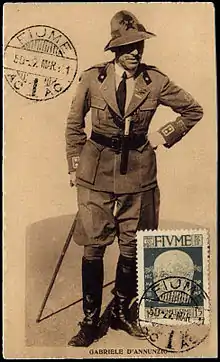Proto-fascism
Proto-fascism refers to the direct predecessor ideologies and cultural movements that influenced and formed the basis of fascism.[1][2] A prominent proto-fascist figure is Gabriele D'Annunzio, the Italian nationalist whose politics influenced Benito Mussolini and Italian Fascism.[1] Proto-fascist political movements include the Italian Nationalist Association (Associazione Nazionalista Italiana, ANI), the German National Association of Commercial Employees (Deutschnationaler Handlungsgehilfen-Verband, DHV) and the German National People's Party (Deutschnationale Volkspartei, DNVP).[2]

Photograph of Gabriele D'Annunzio in 1921. D'Annunzio was an Italian nationalist and poet who is considered a proto-fascist.
Other people who have been labeled proto-fascist because they shared an ideological basis with fascism include:
- Thomas Carlyle (1795–1881)[3]
- Goldwin Smith (1823–1910)[4][5]
- Georges Ernest Boulanger (1837–1891)[6]
- George Fitzhugh (1806–1881)[7]
- John Ruskin (1819–1900)[8][9]
- Charles Maurras (1868–1952)
- Ion Dragoumis (1878–1920)[10][11]
- Patrick Pearse (1879–1916)[12]
- Edgar Julius Jung (1894–1934)
- D. H. Lawrence (1885–1930). The English philosopher Bertrand Russell characterized Lawrence as a "proto-German fascist".[13] This characterization is useful as a demarcation point between Fascism and proto-fascism. The former has totalitarian uniformity as its paradigm, but Russell is referring to Lawrence as a "nonconformist prophet" struggling with individual alienation, looking to the shared identity of ancestral blood and soil for reconnection i.e. an evolution of the German 19th-century Völkisch movement,[14][15] an ideology that was adopted by the National Socialist movement.
- Giuseppe Mazzini (1805–1872). The famous Genoese patriot strongly influenced Italian fascism, especially in its early years. In particular, fascism inherited from Mazzini the fervent irredentism, the concept of class collaboration, the pedagogical vocation and the spirit of solidarity. Mussolini himself was a great Mazzini admirer, and many fascist exponents were Mazzinian such as Italo Balbo, Giovanni Gentile, Giuseppe Bottai and Dino Grandi.[16]
- Francesco Crispi (1818–1901). The known Sicilian statesman was admired by the dictator Mussolini and considered by many scholars as a precursor of Italian fascist regime, due to his authoritarian policies, the nationalist character, his strongman reputation and the aggressive colonial policy implemented during his government.[17][18]
- Rudolf Steiner (1861–1925)
References
- Spackman, Barbara. Fascist Virilities: Rhetoric, Ideology, and Social Fantasy in Italy. p. 78.
- Davies, Peter; Lynch, Derek. The Routledge Companion to Fascism and the Far Right. London, England, UK; New York, New York, USA: Routledge. p. 94.
- Broich, Ulrich; Dickinson, H. T.; Hellmuth, Eckhart; Schmidt, Martin. Reactions to Revolutions: The 1790s and Their Aftermath. p. 255.
- Kramer, Naomi, ed. (2007). Civil Courage: A Response to Contemporary Conflict and Prejudice. Peter Lang. p. 142–143. ISBN 978-1433100574.
- Routledge Library Editions: Racism and Fascism. Routledge, Taylor & Francis. 2021. p. 32. ISBN 9781138934221.
- Fuller, Robert Lynn (2012). The Origins of the French Nationalist Movement, 1886-1914. McFarland. p. 251. ISBN 9780786490257.
- Reyes, Stefan Roel (December 2019). "Antebellum Palingenetic Ultranationalism: The Case for Including the United States in Comparative Fascist Studies". Fascism. Brill Publishers. 8 (2): 307–330. doi:10.1163/22116257-00802005.
- McGovern, William Montgomery (1941). From Luther to Hitler. Harrap. p. 180.
- Tennyson, G. B. (1973). "The Carlyles". In DeLaura, David J. (ed.). Victorian Prose: A Guide to Research. New York: The Modern Language Association of America. p. 78. ISBN 9780873522502.
G. I. Morris in "Divine Hitler" ([Die Neueren Sprachen], 1935) cites his own experience . . . A headmaster had told his students that 'Ruskin and Carlyle were the first National Socialists.'
- Mazis, John (2014). Man For All Seasons: The Uncompromising Life of Ion Dragoumis. The Isis Press. ISBN 978-9754285277.
- "Giánnis Mázis: "O Dragoúmis den écho kamía amfivolía óti ítan énas protofasístas"" Γιάννης Μάζης: "Ο Δραγούμης δεν έχω καμία αμφιβολία ότι ήταν ένας πρωτοφασίστας" [Yannis Mazis: "I have no doubt that Dragoumis was a proto-fascist"]. Εθνικόν Κράτος (in Greek). 4 June 2017. Retrieved 23 October 2018.
- "Patrick Pearse: proto-fascist eccentric or visionary?". History Ireland (Podcast). Retrieved 2019-03-10.
- Russel, Bertrand (1951). The Autobiography of Bertrand Russell 1872-1914. Little, Brown and Company. p. 112.
- Ferretter, Luke (2015). ""A Prison for the Infinite": D. H. Lawrence and Bertrand Russell on the War". Études Lawrenciennes (46). doi:10.4000/lawrence.226.
- Kurlander, Eric (2002). "The Rise of Völkisch-Nationalism and the Decline of German Liberalism: A Comparison of Liberal Political Cultures in Schleswig-Holstein and Silesia 1912-1924". European Review of History: Revue européenne d'histoire. 9 (1): 23–36. doi:10.1080/13507480120116182. ISSN 1350-7486. S2CID 145167949.
- Sullam, Simon Levis (2015). Giuseppe Mazzini and the Origins of Fascism. Palgrave Macmillan. ISBN 978-1137514585.
- Nation-building in 19th-century Italy: the case of Francesco Crispi, Christopher Duggan, History Today, February 1, 2002
- The Randolph Churchill of Italy, by David Gilmour, The Spectator, June 1, 2002 (Review of Francesco Crispi, 1818-1901: From Nation to Nationalism, by Christopher Duggan)
Sources
- Griffin, Roger (2006). The Nature of Fascism. Routledge. ISBN 9781136145889.
This article is issued from Wikipedia. The text is licensed under Creative Commons - Attribution - Sharealike. Additional terms may apply for the media files.